Top 4 Government Support Programs for International Students Interning at Japanese Companies
As the demand for globally minded talent continues to grow, an increasing number of international students express interest in interning at Japanese companies each year. Japan is highly regarded as a country where students can gain valuable business experience, thanks to its advanced technology and detail-oriented organizational culture. However, challenges such as language and cultural barriers, high living costs, and visa procedures can make participation difficult.
To address these issues, the Japanese government and public institutions offer various support programs to help international students take part in internships at Japanese companies. These initiatives aim to alleviate the burden on participants by providing support, including travel and accommodation subsidies, Japanese language education, and internship matching services. At the same time, they also help companies strengthen their readiness to host international interns.
In this article, we introduce four trusted and well-established government-backed support programs designed to help international students intern in Japan with confidence. For those looking to take the first step in their careers through an internship in Japan, these programs offer strong, reliable support.
Ranking of Government Support Programs
1. Vulcanus in Japan (EU-Japan Centre)
2. METI Japan Internship Program (Ministry of Economy, Trade and Industry)
3. JETRO & SME Agency: Internationalization Support Internship Program
4. Regional Government Collaboration: Local Internship & Company Experience Programs (Kyoto, Nagano, etc.)
1. Vulcanus in Japan (EU-Japan Centre)
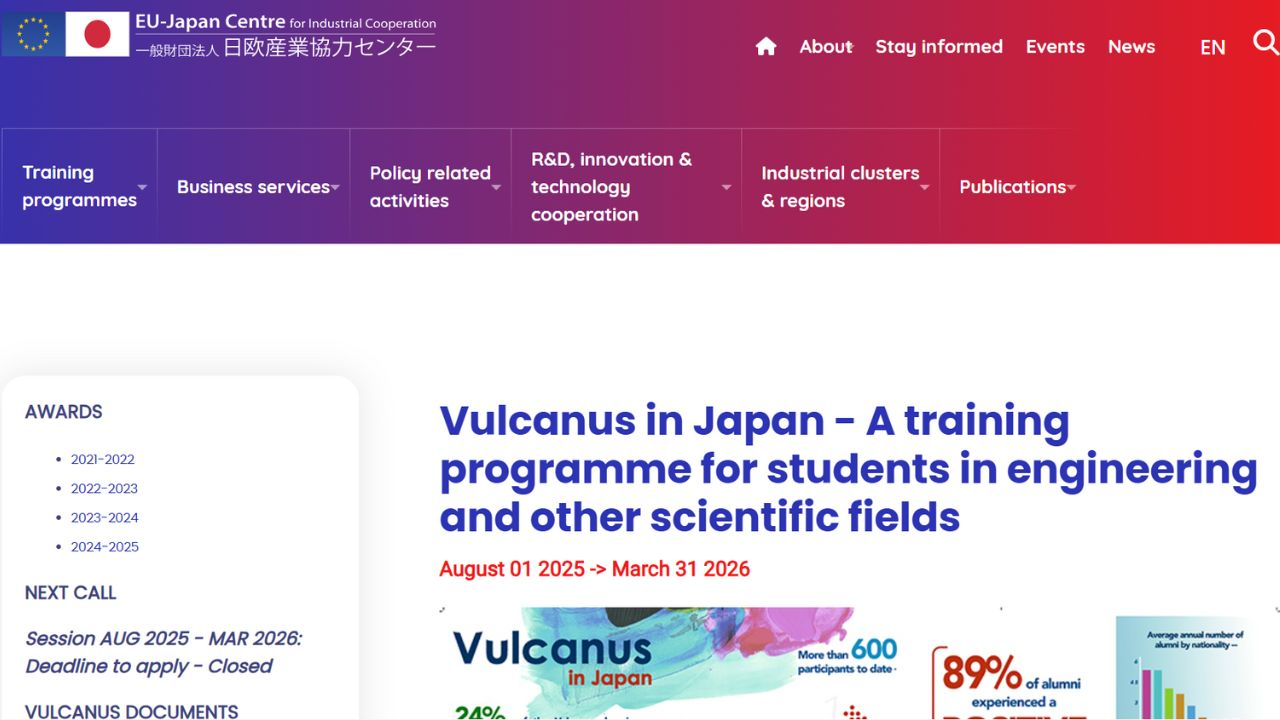
Source: EU-Japan Centre Homepage
For STEM students from EU member states who are interested in a future career in Japan, one of the most established and prestigious programs is Vulcanus in Japan. Launched in 1997 by the EU-Japan Centre for Industrial Cooperation to promote industrial collaboration between the EU and Japan, this internship program enables approximately 40 students each year to spend a whole year in Japan, gaining in-depth insights into both the country’s technology and culture.
The program is distinct in its structure. During the first four months, participants receive intensive Japanese language training in Tokyo. An eight-month paid, full-time internship at a major Japanese company follows. This setup helps participants strengthen their language skills while smoothly adapting to the work culture of Japanese companies. Host companies include globally recognized firms such as Toyota, Hitachi, Fujitsu, and Panasonic, offering students hands-on experience at a high level.
Students receive generous financial support, including coverage of travel and accommodation expenses, Japanese language course fees, and a monthly living stipend of €1,660, which significantly reduces the financial burden. Matching between students and host companies is also handled by the organizing body, minimizing the preparation required from participants.
To be eligible, applicants must be university (third-year or higher) or graduate-level STEM students holding citizenship from an EU member state or certain neighboring countries. Selection is based on academic performance, a statement of motivation, language ability, and other relevant factors.
For students looking to build careers in Europe, long-term immersion in Japan and hands-on experience with Japanese companies provide exceptional value. Many graduates go on to work at European branches of Japanese firms or in international roles involving Japan, making Vulcanus in Japan a highly valuable stepping stone for their future careers.
2. METI Japan Internship Program (Ministry of Economy, Trade and Industry)
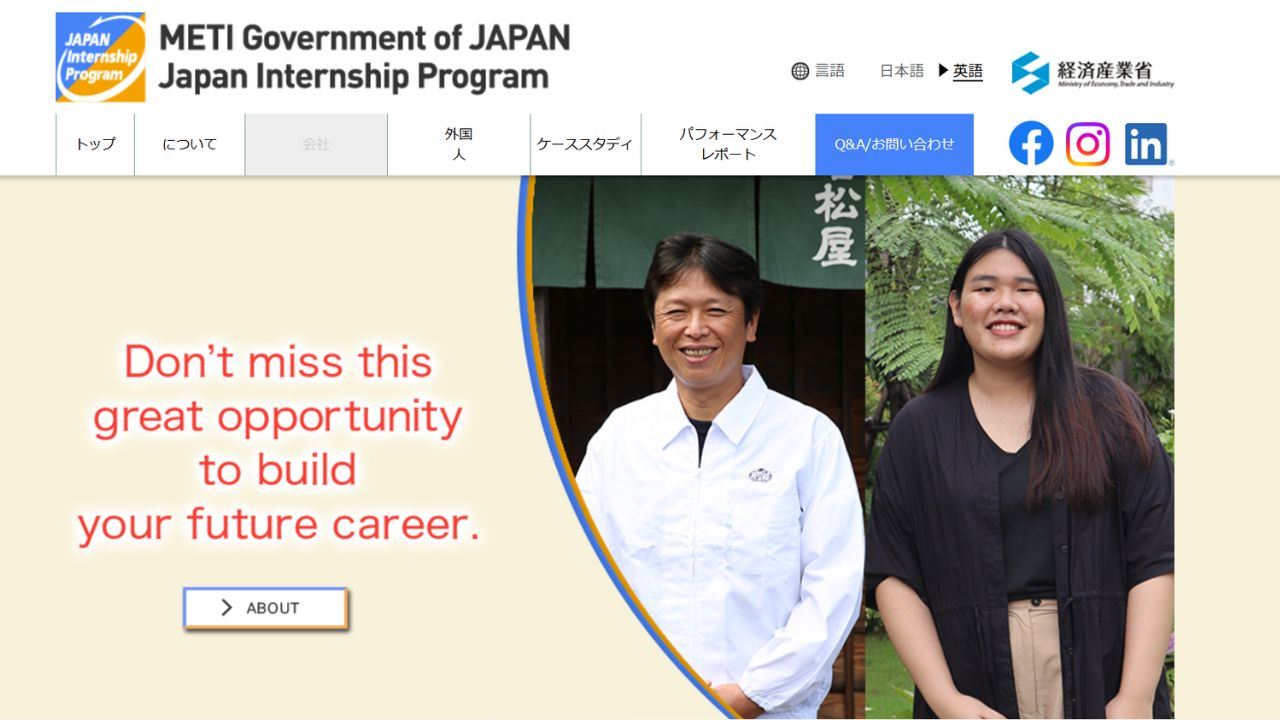
Source: METI Homepage
The METI Japan Internship Program is one of Japan’s leading international talent development initiatives, organized by the Ministry of Economy, Trade and Industry (METI). Launched in 2016, this program provides young professionals from developing countries with the opportunity to gain hands-on work experience at Japanese companies. More than just an internship placement, the program aims to serve as a bridge between global talent and Japanese businesses by fostering cultural exchange and the sharing of diverse values.
The program is held once or twice a year, and selected interns are placed mainly at small and medium-sized enterprises (SMEs) in Japan. Depending on global circumstances, internships can be conducted either in-person or online, offering flexible formats. For in-person programs, participants typically stay in Japan for 3 to 6 months, during which they also attend training sessions on business etiquette, Japanese language and culture, and safety protocols.
Participants receive generous financial support, including round-trip airfare, accommodation, local transportation, internship insurance, and interpreter assistance. Additionally, a monthly stipend of approximately ¥90,000 is provided to cover living expenses, making the program financially accessible.
Applicants must be aged 18 to 39 and reside in developing or emerging countries in regions such as Asia, Africa, or Latin America. While Japanese language skills are not required, applicants should be able to communicate in English. The selection process emphasizes motivation, academic performance, career goals, and demonstrated interest in Japan.
For host companies, the program provides valuable opportunities to build international networks and gain experience working with global talent—especially beneficial for companies seeking to expand overseas. Overall, the METI Japan Internship Program is a meaningful initiative that creates a practical platform for mutual learning and international collaboration.
3. JETRO & SME Agency: Internationalization Support Internship Program
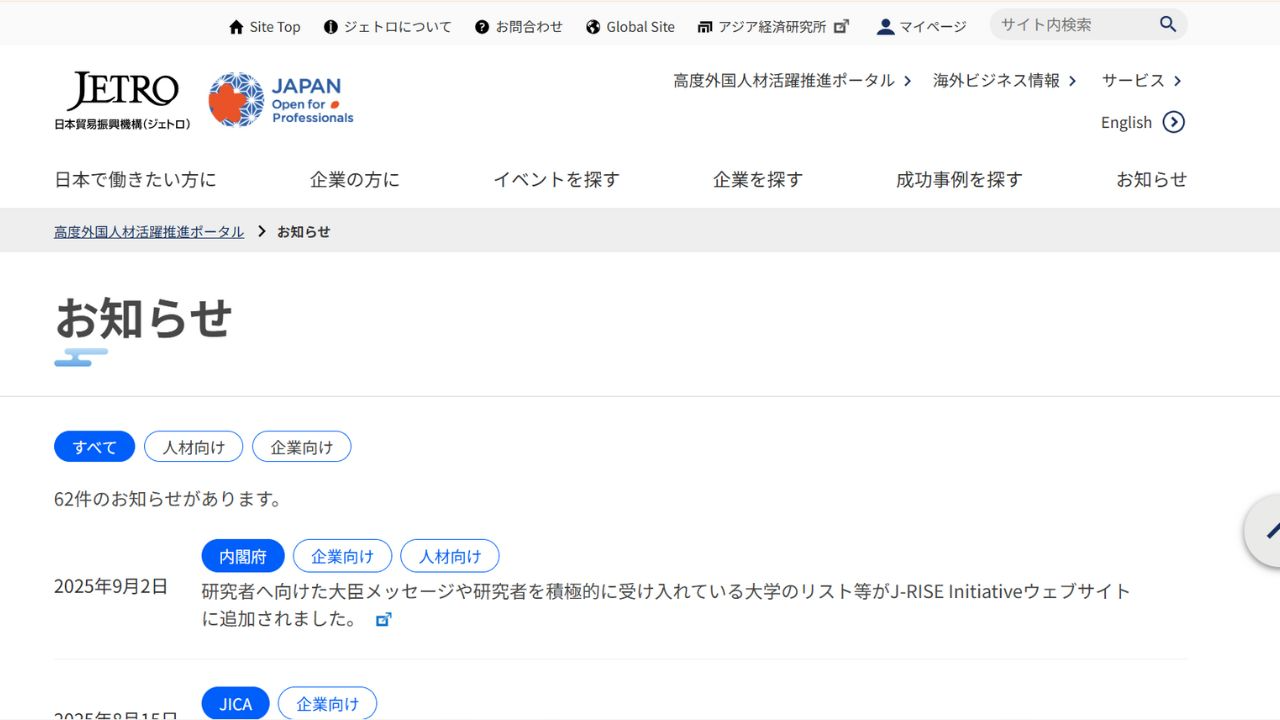
Source: JETRO Homepage
To strengthen the global competitiveness of Japanese companies, JETRO (Japan External Trade Organization) and the Small and Medium Enterprise Agency have partnered to launch the “Internship Program to Promote Internationalization.” This program is a dual-support initiative designed to both host international students already in Japan and create internship opportunities for students and young professionals coming from abroad, with a particular focus on connecting them to small and medium-sized enterprises (SMEs).
What sets this program apart is its individualized matching process, which aligns with the needs of participating companies, along with robust support throughout the internship. Participants gain valuable hands-on experience in Japanese workplaces, learning company culture and workflow, while host companies benefit from comprehensive assistance, including interpreting services, living support, and educational guidance. During the internship, transportation, accommodation, and a living stipend are provided, significantly reducing the financial burden on students.
For students, this program provides an opportunity to gain real-world experience in community-based businesses throughout Japan. For companies, it’s a rare opportunity to meet promising global talent who may lead future international expansion efforts. This mutually beneficial initiative is increasingly recognized as a key strategy for regional companies to enhance their inbound readiness and develop effective global business strategies.
4. Regional Government Collaboration: Local Internship & Company Experience Programs (Kyoto, Nagano, etc.)
Sources: Kyoto Prefecture Homepage & Nagano Prefecture Homepage
A unique program that introduces overseas students to the option of “working in rural Japan” is the regional internship initiative jointly run by local governments, universities, and companies. For example, Kyoto Prefecture operates the “UIJ Turn Internship” program, which supports both domestic and international students by matching them with regional companies and providing accommodation assistance. Nagano Prefecture is also active in offering short-term internships in the tourism and manufacturing sectors.
What makes this program especially appealing is that it goes beyond just company training. Participants engage with residents and experience regional lifestyles and culture, allowing them to gain a real sense of what it’s like to live and work in Japan’s rural areas. Opportunities include working at countryside inns, hot spring resorts, and traditional craft workshops—offering rare experiences that cannot be found in urban centers.
With increasing support, including English-language assistance, accommodation subsidies, and online orientation sessions, the program is becoming more accessible and comfortable for international students. This is a promising initiative that promotes both regional revitalization and international exchange, and its expansion is highly anticipated in the years to come.
Conclusion
In recent years, as the cross-border mobility of talent accelerates, the idea of “doing an internship in Japan” has taken on greater significance for international students, becoming more than just a work experience opportunity. Japan offers unique real-world learning opportunities that can only be experienced on-site, including advanced technology, meticulous teamwork, and a corporate culture rooted in respect and discipline. At the same time, such experiences can profoundly influence students' personal values and career perspectives, often serving as a turning point for rethinking their life direction.
This article introduced four government-backed programs, including:
- “Vulcanus in Japan” for STEM students from EU member states,
- The “METI Japan Internship Program” for young professionals from emerging countries,
- Regional matching support programs by JETRO and the Small and Medium Enterprise Agency,
- Hands-on local internship initiatives led by regional governments.
What all these programs have in common is a strong foundation of financial and lifestyle support for students, along with a sincere commitment from host companies and municipalities to invest in the development of interns. These are not one-sided labor opportunities—they are platforms for mutual learning and the co-creation of future international partnerships.
For overseas students considering internships in Japan, these programs can serve as powerful allies. Reflect on your own field of study, interests, and future goals, and select the program that best aligns with your path. Taking that first step could open the door to a vast world of possibilities—Japan may just be the place that helps you unlock them.















